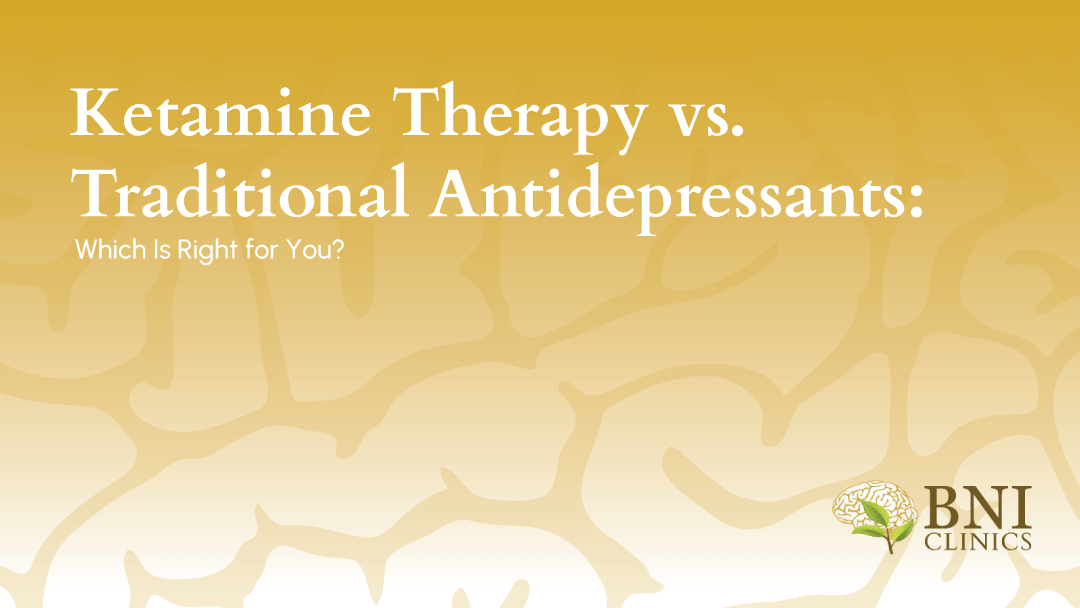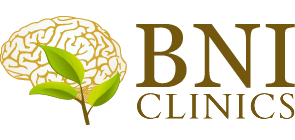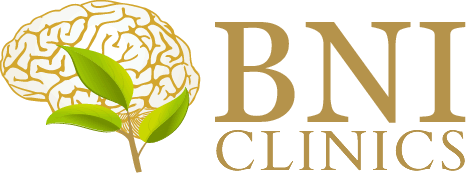Ketamine Therapy vs. Traditional Antidepressants: Which Is Right for You?

Was your teen’s mental health affected by the COVID-19 pandemic? Even before the pandemic, the rate at which teens and young adults were being prescribed antidepressant medication was rising.
According to a study published in 2024 by the American Academy of Pediatrics, however, the rate at which antidepressants were given to teens and young adults rose 64% faster than before the pandemic.
With depression among teens on the rise, it’s important to know your options for treatment. Ketamine is a new treatment to consider that is fast-acting and can tackle treatment-resistant depression. At BNI Clinics, we treat clients of all ages in the Los Angeles area with science-based solutions, including ketamine therapy.
Ketamine Therapy vs Traditional Antidepressants
Ketamine and traditional antidepressants use different mechanisms to relieve depression. Ketamine blocks receptors that sometimes produce depressive symptoms, while traditional antidepressants increase the levels of transmitters that regulate our moods, sleep, and stress response.
Ketamine Therapy
Ketamine is a fast-acting general anesthetic that has been proven to reduce depressive symptoms and suicidal thoughts in mere hours. It has been proven in multiple studies to be an effective option for treatment-resistant depression.
While researchers still don’t have the full picture of how ketamine works, they know it dampens or blocks N-methyl-D-aspartate (NMDA) receptors in the brain and triggers glutamate to be released. Glutamate is a neurotransmitter that keeps your brain energized and carries chemical messages throughout the brain, among other jobs. NMDA receptors have been linked to behavioral changes in people due to inescapable stress, meaning substances that can reduce neurological activity at these receptors may have an antidepressant effect. Ketamine also has anti-inflammatory and pain-reducing properties, and there are likely several biological processes involved in the medication’s antidepressant effect, according to research.
Ketamine has some possible side effects, including dissociation, hallucinations, high blood pressure, abnormally fast heart rate, nausea, vomiting, headaches, and dizziness.
Traditional Antidepressants
Traditional antidepressants work by changing the activity of the neurotransmitters serotonin, norepinephrine, and dopamine. These regulate mood, appetite, sleep, stress response, motivation, reward, and pleasure. There are several types of traditional antidepressants, and they all work differently. Here are the two most popular types:
- Selective serotonin reuptake inhibitors (SSRIs): These increase serotonin levels in the brain.
- Serotonin and norepinephrine reuptake inhibitors (SNRIs): These increase serotonin and norepinephrine levels in the brain.
There is a delayed response between taking an SSRI or SNRI and feeling the effects, however. It takes at least a couple of weeks to know if the medication is helping.
Traditional antidepressants can cause nausea, vomiting, diarrhea, weight gain, sleepiness, and decreased sex drive or efficacy in sex.
Ketamine and Traditional Antidepressants: The Similarities
Ketamine and traditional antidepressants both target brain chemistry to relieve symptoms of depression. They both build the brain’s neuroplasticity, the ability to adapt and build new connections, and aim to regulate mood and reduce suicidal thoughts.
Ketamine and Traditional Antidepressants: The Differences
Traditional antidepressants and ketamine have distinct differences that are important to consider when deciding on a treatment.
- How long does it take to work? Ketamine takes only a couple of hours to be effective, while traditional antidepressants take two to six weeks to yield results
- How does it work? These two medications work differently on a chemical and neurobiological level
- How long will you take it? Traditional antidepressants are typically taken for the long haul to manage depression, while ketamine infusion therapy lasts six weeks. Esketamine treatment can last longer.
- Where is it administered? Traditional antidepressants can be prescribed and taken at home. Ketamine must be administered in an office setting where there is supervision and trained medical professionals in case of a medical emergency.
- What kind of depression does it address? Ketamine is proven to work on people with depression who have tried traditional antidepressants and other treatments, but they don’t work. This is called treatment-resistant depression. Traditional antidepressants are for anyone experiencing depression.

How to Know Which Treatment Is Right for You
One of the main things to consider when deciding whether to try ketamine therapy is the other treatments you have tried for your depression. If medications and therapies have not been enough, trying ketamine or esketamine (a type of ketamine deemed safer by the FDA for depression treatment) may be the answer and the way you can find relief. It is fast-acting, so if you need immediate relief from intense depressive symptoms, it will help.
Another consideration is that insurance companies may not cover ketamine for the treatment of psychological disorders because it hasn’t been approved by the FDA for this purpose yet. Esketamine is FDA-approved for treating depression, but it may still come with an out-of-pocket cost. Traditional antidepressants are more likely to be covered by insurance.
Ketamine Therapy at BNI Clinics
Ketamine is a relatively new way of treating depression and other psychiatric conditions, but at BNI Clinics, we bring you the best forms of treatment available. A life not dictated by constant and recurring depression symptoms is now possible through our ketamine clinic.
BNI Clinics is an outpatient mental health center in Agoura Hills, California, that serves clients of all ages. We are run by triple-board-certified psychiatrists who center effective care on behavioral neuroscience, holistic treatment modalities, individualized treatment plans, and evidence-based therapeutic practices. Call us today at 310-691-5005 to learn more.
BNI Treatment Centers: Science-based, evidence-backed, compassion-led.


